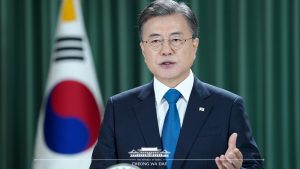South Korean President Moon Jae-in made international headlines in recent days after reportedly committing the country to carbon neutrality in the next 30 years. Translated by some as a vow to “achieve carbon neutrality by 2050,” the brief statement is more accurately translated as “move towards the goal of carbon neutrality.” This follows a pattern of similarly vague statements made this year, from the ruling Democratic Party’s pledge in April to “actualize a zero carbon society,” to the government’s first policy statement in July that called for a move “towards a carbon neutral society.”
This intentional ambiguity, combined with a lack of concrete action, and the country’s likely failure to achieve its 2030 emissions targets, raises concern among South Korea’s climate action networks. The government, and the conglomerates that dominate the South Korean economy, remain wedded to perpetual growth and technological climate solutions. It is hard to believe that many in power sincerely view 2050 carbon neutrality as achievable. This underlying lack of ambition is reflected in the government’s weak emissions targets, and a Green New Deal that seems more focused on the economy than on the environment.
Government ambiguity and obfuscation is made easier by the relative isolation of the South Korean public from mainstream discourse in other developed countries. This muddying of the waters extends to domestic environmental issues, especially air pollution. Air pollution is linked to the death of nearly 17,000 people each year in South Korea. In 2018, the government responded to growing public pressure by tightening its air quality index to bring it in line with the United States. Well, almost.
While every country has its own unique air quality index, those in developed countries tend to follow a similar pattern: green represents good air quality; yellow or orange indicates moderate quality; and a range of oranges, reds, and purples warn of more severe pollution. But in South Korea blue represents good and green moderate.
This may seem trivial, but this subtle manipulation matters. South Korea has always had bad air quality but it was only after extensive media coverage and the rise of smartphone monitoring apps that the issue gained traction with the public. Coloring the city of Seoul an environmentally friendly green, when it should be a more concerning yellow, is simply deceptive.
South Korea’s clean air goals are intimately tied to coal-fired power plants and a move to renewables. While the definition of renewables is contentious in most countries, the South Korean government has gone one step further by creating its own phrase: new and renewable energy. This includes not only genuine renewables and biofuels, but a whole range of fossil fuel related energy sources, such as liquefied and gasified coal, gray hydrogen, and gasified heavy residual oil.
This distinction is generally glossed over in government statements, and the phrase is simply translated as renewable energy in English-language press releases. Hydrogen is a perfect example of this misdirection: promoted by the government as green energy, while knowingly produced from fossil fuels.
At the beginning of the COVID-19 pandemic, Moon was guilty of downplaying the crisis. It was only after an outbreak in the city of Daegu that the government started communicating the enormity of the emergency. We are again seeing the same hand wringing and stalling from the Moon administration with the climate crisis. Be it climate change or air pollution, opinion poll after opinion poll show that South Koreans are alarmed. But if the government continues to misrepresent the dangers and obscure its plans, it will fail to prepare the country for the coming environmental crisis and the tough decisions ahead.
Sam Macdonald is the International Solidarity Coordinator for the Korean Federation for Environmental Movements, South Korea’s largest environmental NGO.

































